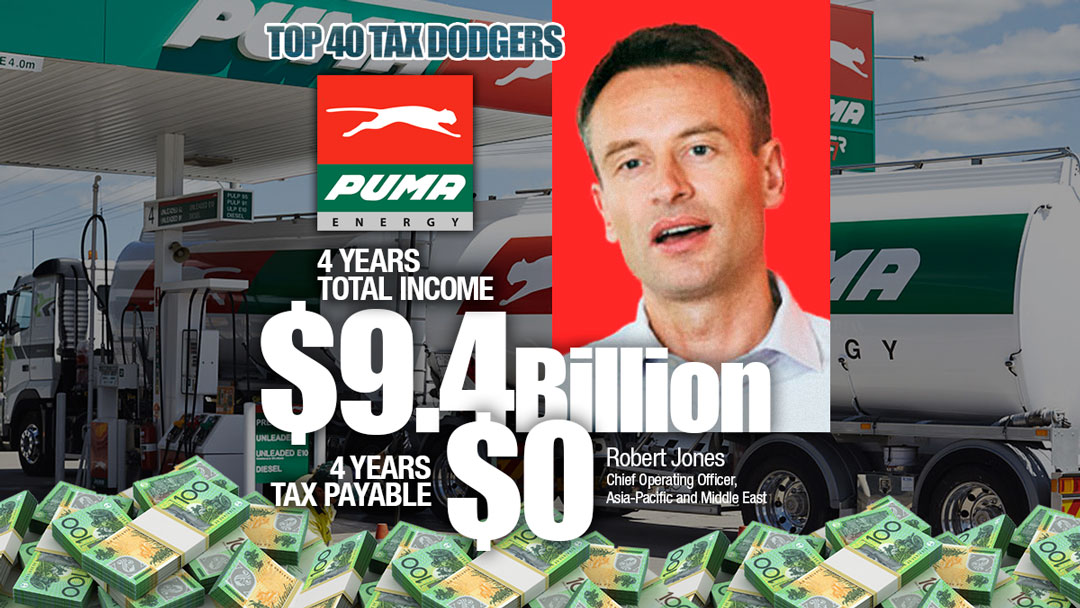Puma Energy (Australia) Holdings Pty Ltd
| 4 year total income | $9,468,972,557 |
| 4 year taxable income | $0 |
| 4 year margin | 0.00% |
| 4 year tax payable | $0 |
| 4 year tax payable | 0.00% |
Another tax dodging multinational oil company; albeit, unlike Shell, Chevron and Exxon, Puma is just a trader and distributor and a very low-profile one at that.
The thing which stands out in the notes to Puma’s financial statements is its links to the infamous, sanction-busting Trafigura. This, the world’s second biggest oil trader, left up to 100,000 people with skin rashes, headaches and respiratory problems via a toxic waste dump in 2006 on the Ivory Coast. It was also involved in the Iraq Oil-for-Food Scandal.
Among its many related party transactions, Puma bought $596 milliom in oil from Trafigura last year. Both companies are connected via Singapore following Puma’s entry to Australia in 2013 when it bought 250 petrol stations, two oil import terminals and five fuel depots in three separate acquisitions.
It appears to have paid no tax since. Last year, revenue spiked from $2.1 billion to $2.5 billion and Puma recorded a loss and a tax benefit $24 million ($19 million prior).
Puma spends $1 billion a year buying fuel from its associates. There is a large related party loan of $426 million owed to one foreign associate – interest rate 6 per cent, no fixed repayments.
Last year, the cost of Puma’s external borrowings was $2.5 million while it paid $22 million to related parties. It also ramped up the issue of preference shares which cost $136 million.
Management fees paid to related parties were $17.8 million last year. While it pays no tax, even ramping up its tax loss shelter last year, it manages to propose dividends each year to its foreign associates. Auditor is EY.
Public support is vital so that we can continue to investigate and publish articles that tell truth to power. Subscribe with a monthly contribution if you can, see below. Join our newsletter, share and like posts, if you can not make a financial contribute.
2019 METHODOLOGY
We are counting down the Top 40 Tax Dodgers. There are now four years of tax transparency data published by the Tax Office and we have used this data to work out which large companies operating in Australia have paid the least tax, or no tax.
Notable new economy players such as Google, eBay, Booking.com, Expedia are not near the top of the ATO list. That’s because they don’t (yet) recognise all income earned here; instead, they book Australian revenue directly to their associates offshore. They will be ranked in due course.
For other large corporations, and in particular, multinationals, the main steps in avoiding tax are made by reducing their taxable as much as they can; usually by sending it offshore in interest on loans, “service” fees or other payments to foreign associates. So, we have set a threshold. We have included only those companies which managed to wipe out 99.5 per cent or more of their taxable income over four years.
Qantas, therefore, is not on this list, although it has enormous income and has paid no income tax in Australia for many years. It misses the cut-off due to it not eliminating more than 99.5 per cent of its total income.
The airline had made large losses which were offset against profits. Many large corporations which have paid zero tax in ATO data, have legitimately made losses and have therefore built up “tax-loss shelter”.
Further explanation of methodology can be found here.
Many others however, such as ExxonMobil and EnergyAustralia, are on the list as they managed to eliminate all or most of their taxable income by “debt-loading” or other means of aggressive tax avoidance.
In this, the second iteration of michaelwest.com.au corporate tax rankings, we have ranked companies purely on the Tax Office data. We will also publish a list of Australia’s better corporate taxpayers, those companies who contribute most to the country in which they operate.
The Tax Office data is not a perfect guide. It does not record refunds, only tax payable and is often at odds with disclosures made for accounting purposes. In some cases, there are multiple entities with the same ultimate offshore parent reporting. One entity may pay zero tax, another may pay at the statutory 30 per cent rate (even if on low taxable income). We endeavour to be fair in our reporting to recognise these issues.
The data also recognises trusts as well as companies. For trusts, it is the members (investors) rather than the trusts who are ordinarily required to pay the tax. In many cases however it is fair to recognise trust structures for what they are, as tax is often the main reason these vehicles have been structured as trusts.
Companies are welcome to debate their rankings or to touch base to clarify or defend their tax practices. We will append or link these submissions.
Hydrox has been taken off the list as it never made a profit.
Michael West established Michael West Media in 2016 to focus on journalism of high public interest, particularly the rising power of corporations over democracy. West was formerly a journalist and editor with Fairfax newspapers, a columnist for News Corp and even, once, a stockbroker.

